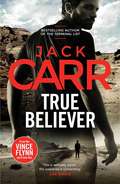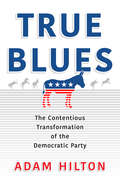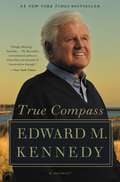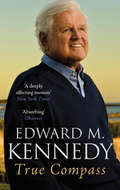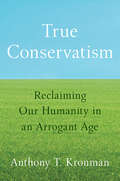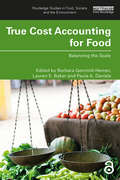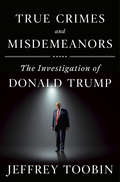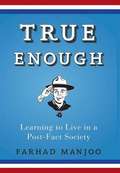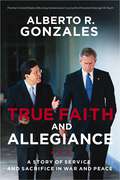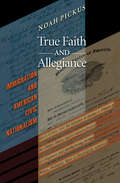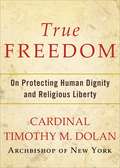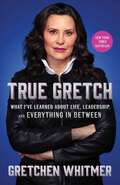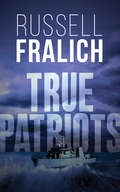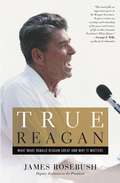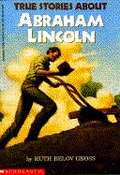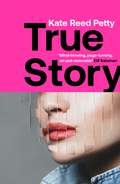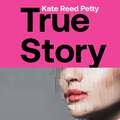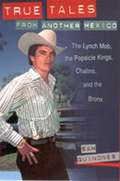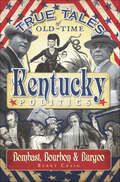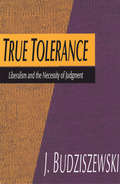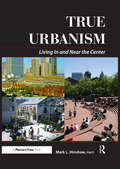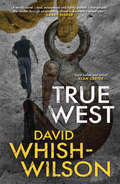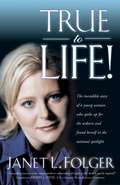- Table View
- List View
True Believer: The Terminal List, True Believer, And Savage Son (Terminal List #2)
by Jack Carr**SOON TO BE A TV SERIES STARRING CHRIS PRATT** 'This is seriously good… the suspense is unrelenting, and the tradecraft is so authentic the government will probably ban it – so read it while you can!' Lee ChildA high-intensity roller-coaster ride, True Believer explodes with action and authenticity that cements Jack Carr as the new leader in political thrillers. Following his brutal quest for revenge, former Navy SEAL James Reece has fled the United States, emerging deep in the wilds of Mozambique. But he can&’t stay hidden for long – when a string of horrific terrorist attacks plagues the Western world, the CIA tracks him down and recruits him. Now a reluctant tool of the United States government, Reece must travel the globe, targeting terrorist leaders and unravelling a geopolitical conspiracy that will have worldwide repercussions . . .If you loved Lee Child's Jack Reacher, Vince Flynn's Mitch Rapp or Mark Dawson's John Milton, you will love True Believer and the James Reece series!Praise for Jack Carr and the James Reece series: 'With a particular line in authentic tradecraft, this fabulously unrelenting thrill-ride was a struggle to put down' Mark Dawson 'Gritty, raw and brilliant!' Tom Marcus &‘So powerful, so pulse-pounding, so well-written—rarely do you read a debut novel this damn good&’ Brad Thor 'With technical ferocity and devastating action sequences, Carr writes both from the gut and a seemingly infinite reservoir of knowledge in the methods of human combat. Loved it!' Chris Hauty &‘The best debut thriller of 2018&’ Washington Times 'Thrilling' Publishers Weekly 'A powerful, thoughtful, realistic, at times terrifying thriller that I could not put down. A terrific addition to the genre, Jack Carr and his alter-ego protagonist, James Reece, continue to blow me away' Mark Greaney 'One of this year&’s hottest thrillers, and a perfect fit for fans of Vince Flynn, Brad Thor, and Daniel Silva' The Real Book Spy
True Blue: My Journey from Beat Cop to Suspended FBI Whistleblower
by Stephen FriendA suspended special agent explains his decision to turn whistleblower and expose FBI politicization and abuse against conservative America.Stephen Friend had his dream job as an FBI special agent. After nearly a decade of combating violent crime, human trafficking, and child predators, he was reassigned to the FBI&’s unprecedented investigation of the political unrest at the United States Capitol on January 6, 2021. Friend soon uncovered efforts by the FBI and Department of Justice to manipulate statistics and exaggerate the nationwide threat of domestic terrorism. Friend spotlighted how the politicized FBI was cooking the books to support an ongoing narrative from the Joe Biden administration to label Donald Trump voters as violent extremists. Friend witnessed overzealous practices to harass conservative Americans and realized the FBI was turning its investigative processes into a punishment. When the married father of two made his bombshell allegations in a whistleblower disclosure, leaders within the FBI exposed themselves as partisan, ambitious players who insisted that January 6th protestors killed police officers and attempted to seize American democracy. Hell-bent on suppressing Friend from exposing the truth, FBI officials seized his gun and badge and suspended him from working as a special agent. In this memoir, Friend reflects on the lessons and life experiences that led him to ultimately risk his career to uphold his FBI special agent oath to protect and defend the United States Constitution against all enemies—both foreign and domestic.
True Blues: The Contentious Transformation of the Democratic Party (American Governance: Politics, Policy, and Public Law)
by Adam HiltonWho governs political parties? Recent insurgent campaigns, such as those of Donald Trump and Bernie Sanders, have thrust this critical question to the center of political debate for casual observers and scholars alike. Yet the dynamics of modern party politics remain poorly understood. Assertions of either elite control or interest group dominance both fail to explain the Trump victory and the surprise of the Sanders insurgency and their subsequent reverberations through the American political landscape.In True Blues, Adam Hilton tackles the question of who governs parties by examining the transformation of the Democratic Party since the late 1960s. Reconceiving parties as "contentious institutions," Hilton argues that Democratic Party change was driven by recurrent conflicts between groups and officeholders to define and control party identity, program, and policy. The outcome of this prolonged struggle was a wholly new kind of party—an advocacy party—which institutionalized greater party dependence on outside groups for legitimacy and organizational support, while also, in turn, fostering greater group dependency on the presidency for the satisfaction of its symbolic and substantive demands. Consequently, while the long conflict between party reformers and counter-reformers successfully opened the Democratic Party to new voices and identities, it also facilitated the growth of presidential power, rising inequality, and deepening partisan polarization.Tracing the rise of the advocacy party from the fall of the New Deal order through the presidency of Barack Obama, True Blues explains how and why the Democratic Party has come to its current crossroads and suggests a bold new perspective for comprehending the dynamics driving American party politics more broadly.
True Compass: A Memoir
by Edward M. KennedyEdward M. Kennedy is widely regarded as one of the great Senators in the nation's history. He is also the patriarch of America's most heralded family. In this landmark autobiography, five years in the making, Senator Kennedy speaks with unprecedented candor about his extraordinary life. The youngest of nine children born to Joseph P. Kennedy and Rose Fitzgerald Kennedy, he came of age among siblings from whom much was expected. As a young man, he played a key role in the presidential campaign of his brother, John F. Kennedy. In 1962, he was elected to the U.S. Senate, where he learned how to become an effective legislator. His life has been marked by tragedy and perseverance, a love for family and an abiding faith. He writes movingly of his brothers and their influence on him; his years of struggle in the wake of their deaths; his marriage to the woman who changed his life, Victoria Reggie Kennedy; his role in the major events of our time (from the civil rights movement to the election of Barack Obama); and how his diagnosis of a malignant brain tumor has given even greater urgency to his long crusade for improved health care for all Americans. Written with warmth, wit, and grace,True Compass is Edward M. Kennedy's inspiring legacy to readers and to history.
True Compass: A Memoir
by Senator Edward M. KennedyA landmark autobiography and the definite account from a member of America's most heralded family.As a young man, Edward M Kennedy played a key role in the presidential campaign of his brother, John F. Kennedy. In 1962, he was elected to the U.S. Senate, where he learned how to become an effective legislator. His life was marked by tragedy and perseverance; he writes movingly of his brothers and his years of struggle in the wake of their deaths; his marriage to Victoria, the woman who changed his life and his role in the major events of our time from civil rights, Vietnam and Watergate to the quest for peace in Northern Ireland.
True Conservatism: Reclaiming Our Humanity in an Arrogant Age
by Anthony T. KronmanDrawing on the riches of the Western tradition, Anthony T. Kronman defends a humane conservativism for our enlightened age As the party of the left has grown more strident, its conservative critics have responded in kind. Each year conservatives do a poorer job of defending their position as a citadel of human values without lapsing into an angry assault on ideals that they and progressives share. It becomes harder to see the enduring appeal of a true conservatism that celebrates the worth of custom and inheritance; the splendor of what is excellent and rare; the expansive solidarity of our friendship with the dead; and the dignity, indeed necessity, of our longing for a connection to the eternal and divine—while affirming that these timeless human goods are compatible with the modern ideals of equality, toleration, and reasoned argument. In this bracing book, Anthony Kronman defends a conservative philosophy of life that respects our enlightened ideals but decries the damage their arrogant simplification causes in our moral, political, and spiritual lives. Drawing on the work of Aristotle, Cicero, Spinoza, Burke, Hume, Madison, Tocqueville, Lincoln, Arendt, Heidegger, and others, he argues that humanism is conservatism, today as in the past. He reminds us that our humbling parameters make possible every form of human greatness, every human glory, every human love worthy of the name.
True Cost Accounting for Food: Balancing the Scale (Routledge Studies in Food, Society and the Environment)
by Barbara Gemmill-HerrenThis book explains how True Cost Accounting is an effective tool we can use to address the pervasive imbalance in our food system. Calls are coming from all quarters that the food system is broken and needs a radical transformation. A system that feeds many yet continues to create both extreme hunger and diet-related diseases, and one which has significant environmental impacts, is not serving the world adequately. This volume argues that True Cost Accounting in our food system can create a framework for a systemic shift. What sounds on the surface like a practice relegated to accountants is ultimately a call for a new lens on the valuation of food and a new relationship with the food we eat, starting with the reform of a system out of balance. From the true cost of corn, rice and water, to incentives for soil health, the chapters economically compare conventional and regenerative, more equitable farming practices in and food system structures, including taking an unflinching look at the true cost of cheap labour. Overall, this volume points towards the potential for our food system to be more human-centred than profit-centred and one that has a more respectful relationship to the planet. It sets forth a path forward based on True Cost Accounting for food. This path seeks to fix our current food metrics, in policy and in practice, by applying a holistic lens that evaluates the actual costs and benefits of different food systems, and the impacts and dependencies between natural systems, human systems, agriculture and food systems. This volume is essential reading for professionals and policymakers involved in developing and reforming the food system, as well as students and scholars working on food policy, food systems and sustainability.
True Crimes and Misdemeanors: The Investigation of Donald Trump
by Jeffrey ToobinFrom CNN chief legal analyst and bestselling author Jeffrey Toobin, a real-life legal thriller about the prosecutors and congressional investigators pursuing the truth about Donald Trump's complicity in several crimes--and why they failed.Donald Trump's campaign chairman went to jail. So did his personal lawyer. His long-time political consigliere was convicted of serious federal crimes, and his national security advisor pled guilty to others. Several Russian spies were indicted in absentia. Career intelligence agents and military officers were alarmed enough by the president's actions that they alerted senior government officials and ignited the impeachment process. <P><P>Yet despite all this, a years-long inquiry led by special counsel Robert Mueller, and the third impeachment of a president in American history, Donald Trump survived to run for re-election. Why?Jeffrey Toobin's highly entertaining definitive account of the Mueller investigation and the impeachment of the president takes readers behind the scenes of the epic legal and political struggle to call Trump to account for his misdeeds. With his superb storytelling and analytic skills Toobin recounts all the mind-boggling twists and turns in the case--Trump's son met with a Russian operative promising Kremlin support! <P><P>Trump paid a porn star $130,000 to hush up an affair! Rudy Giuliani and a pair of shady Ukrainian-American businessmen got the Justice Department to look at Russian-created conspiracy theories! Toobin shows how Trump's canny lawyers used Mueller's famous integrity against him, and how Trump's bullying and bluster cowed Republican legislators into ignoring the clear evidence of the impeachment hearings.Based on dozens of interviews with prosecutors in Mueller's office, Trump's legal team, Congressional investigators, White House staffers, and several of the key players, including some who are now in prison, True Crimes and Misdemeanors is a revelatory narrative that makes sense of the seemingly endless chaos of the Trump years. <P><P>Filled with never-before-reported details of the high-stakes legal battles and political machinations, the book weaves a tale of a rogue president guilty of historic misconduct, and how he got away with it. <P><P><b>A New York Times bestseller</b>
True Enough: Learning to Live in a Post-Fact Society
by Farhad ManjooWhy has punditry lately overtaken news? Why do lies seem to linger so long in the cultural subconscious even after they've been thoroughly discredited? And why, when more people than ever before are documenting the truth with laptops and digital cameras, does fact-free spin and propaganda seem to work so well? True Enough explores leading controversies of national politics, foreign affairs, science, and business, explaining how Americans have begun to organize themselves into echo chambers that harbor diametrically different facts-not merely opinions-from those of the larger culture.
True Faith and Allegiance: A Story of Service and Sacrifice in War and Peace
by Alberto R. GonzalesTrue Faith and Allegiance is the highly-anticipated personal history from Alberto R. Gonzales, former Attorney General of the United States and former Counsel to the President--the only lawyer and only Hispanic to hold both these positions--an ultimate insider in the most tumultuous events in recent history. Born to a poor but proud working-class family in Humble, Texas, Gonzales was raised along with his seven siblings in a modest 2-bedroom home. His loving and devout parents taught him the conservative values of hard work and accountability that motivated Gonzales to the highest echelons of power. He was a confidante to President George W. Bush during the crucible of the 9/11 attacks, and he played a vital role in the administration's immediate response to protect America and the far-reaching steps to prevent further harm.
True Faith and Allegiance: Immigration and American Civic Nationalism
by Noah PickusTrue Faith and Allegiance is a provocative account of nationalism and the politics of turning immigrants into citizens and Americans. Noah Pickus offers an alternative to the wild swings between emotionally fraught positions on immigration and citizenship of the past two decades. Drawing on political theory, history, and law, he argues for a renewed civic nationalism that melds principles and peoplehood. This tradition of civic nationalism held sway at America's founding and in the Progressive Era. Pickus explores how, from James Madison to Teddy Roosevelt, its proponents sought to combine reason and reverence and to balance inclusion and exclusion. He takes us through controversies over citizenship for blacks and the rights of aliens at the nation's founding, examines the interplay of ideas and institutions in the Americanization movement in the 1910s and 1920s, and charts how both left and right promoted a policy of neglect toward immigrants and toward citizenship in the second half of the twentieth century. True Faith and Allegiance shows that contemporary debates over a range of immigration and citizenship policies cannot be resolved by appeals to fixed notions of creed or culture, but require a supple civic nationalism that bridges the gap between immigrants' needs and American principles and practices. It is critical reading for scholars, policy makers, and all who care about immigrants and about America.
True Freedom: On Protecting Human Dignity and Religious Liberty
by Timothy M. DolanTrue FreedomOn Protecting Human Dignity and Religious LibertyCardinal Timothy M. Dolan, Archbishop of New YorkAre American liberties on the endangered species list? In this eBook original, the Archbishop of New York and president of the United States Conference of Catholic Bishops issues a plea for all citizens to reject the cynicism of the day and foster a culture in which religious freedom and all human life are infinitely valued.Religion and the dignity of human life are under attack by a variety of threats in the modern world including abortion, infanticide, eugenics, misuse of artificial reproductive technologies, an unjust distribution of economic resources, war, the arms trade, drugs, and human trafficking. What can be done to stop this? Cardinal Timothy Dolan explains the need for all Americans to embrace a new culture rooted in what Blessed John Paul II called the Gospel of Life where the sacredness of all human life, and the freedoms that are their birthright, are upheld, respected and protected by law.
True Gretch -- Young Adult Edition: Lessons for Anyone Who Wants to Make a Difference
by Gretchen WhitmerThe young adult edition of the unconventionally honest, deeply personal, and sharply funny account from Michigan governor and rising Democratic star Gretchen Whitmer is packed with remarkable insights for young people wishing to make a difference in the world.When Gretchen Whitmer was growing up, her beloved grandmother Nino taught her that you can always find something good in other people. &“Even the meanest person might have pretty eyes,&” she would say, a piece of advice that Gretchen carries with her today in her role as the governor of Michigan. (And one that resonated more than another her grandmother offered: &“never part your hair in the middle.&”) From navigating a kidnapping and assassination plot in which she herself was a target to facing monumental challenges during a global pandemic, Big Gretch (as she&’s now known) shares the key pieces of wisdom that have shaped her trailblazing career and personal experiences in this often hilarious, always uplifting book. Along the way, she tells stories about growing up gutsy in the Midwest, the wild comments she&’s encountered as a public figure, and how to neutralize high-profile bullies with a fearless sense of humor. Told in her famously straightforward and slyly funny voice, this young adult edition of the governor&’s story not only offers an intimate insight into the life of a politician with an astounding journey, but also affords extraordinary lessons for young people everywhere who wish to make a difference in the world.
True Gretch: What I've Learned About Life, Leadership, and Everything in Between
by Gretchen WhitmerFrom trailblazing Michigan governor and rising Democratic star Gretchen Whitmer comes an unconventionally honest, personal, and funny account of her remarkable life and career, full of insights that guided her through a global pandemic, showdowns with high-profile bullies, and even a kidnapping and assassination plot. When Gretchen Whitmer was growing up, her beloved grandmother Nino taught her that you can always find something good in other people. &“Even the meanest person might have pretty eyes,&” she would say. Nino&’s words persuaded Whitmer to look for the good in any person or situation—just one of many colorful personal experiences that have shaped her political vision. (And, as Whitmer writes, one that resonated more than another piece of advice her grandmother offered, to &“never part your hair in the middle.&”) In this candid and inspiring book, Whitmer reveals the principles and instincts that have shaped her extraordinary career, from her early days as a lawyer and legislator and her 2018 election as governor of Michigan, to her bold and innovative actions as she led the state through a series of unprecedented crises. Her motto in politics, she writes, is to &“get shit done.&” Whitmer shares the lessons in resilience that steered her through some of the most challenging events in Michigan&’s history, such as the Covid-19 pandemic, a five-hundred-year flood, the rise of domestic terrorism, and the fierce fight to protect reproductive rights. Along the way, she tells stories about the outsize characters in her family, her lifelong clumsy streak, the wild comments she&’s heard on the campaign trail, her self-deprecating social media campaigns (including her star turn as a talking potato with lipstick), and the slyly funny tactics she deploys to neutralize her opponents. Written with Whitmer&’s trademark sense of humor and straight-shooting style, True Gretch is not only a compelling account of her remarkable journey, but also a blueprint for anyone who wants to make a difference in their community, their country, or the world. It is a testament to the power of humor, perseverance, and compassion in the face of darkness.
True Patriots
by Russell FralichA country to kill for … The career of Claire Marcoux, a young naval officer, threatens to come crashing down after she orders the ship under her command to return fire on a boat that she was supposed to rescue. The quiet life of Daniel Ritter, a new professor in a new town, is turned upside down when the celebrity entrepreneur he was unexpectedly invited to meet is found murdered. Thrown together by chance, Claire and Daniel discover that they are involved in the same fight against an unknown enemy — a foe with a plot that endangers the lives of many … and the very existence of the country they both cherish.
True Reagan: What Made Ronald Reagan Great and Why It Matters
by James RosebushWHAT MADE RONALD REAGAN TICK? What was the secret to his greatness, the source of his influence, the key to his character, the strength behind his leadership? And why does it matter to the nation today? Just the mention of his name still evokes deep admiration and affection among Americans of every stripe, on both sides of the aisle. Many have previously sought to capture the essence of this very public figure often called "mysterious and unknowable." But now, as James Rosebush tells Reagan's story from first-hand experience in TRUE REAGAN, we come closer to understanding the heart of this great American. In his roles as the longest-serving Chief of Staff to Nancy Reagan and Deputy Assistant to President Reagan (his point man on philanthropy and public/private partnerships), James Rosebush had unrivaled one-on-one access to Reagan, observing his personality, his decision-making, his guarded nature. Rosebush's revelations are moving and meant to inspire us to look to our 40th President for guidance now as we face the global challenges of a complicated 21st century. Ronald Reagan was first and foremost an intensely private person, although the life he led placed him at the center of people's attention from his earliest years. Small-town boy and college athlete, sportscaster and lifelong sports fan, actor and movie star, union leader and TV spokesman, Democrat and Republican, governor and president: what an incredible and extraordinary path. Rosebush tells how his center core was formed by his mother, who devoted herself to helping others even as the Reagans struggled themselves. The spiritual foundation she instilled in him by teaching him the Bible governed his thoughts, beliefs and actions all his life. In a very real sense, his upbringing destined Reagan to become a global evangelist for American Exceptionalism - but importantly, as Rosebush learned first-hand, that did not mean Reagan thought Americans themselves were superior, as today's pundits and politicians often preach. Rather, Reagan believed that the ideals of America's founding were superior, enabling all Americans to live lives based on high ideals and spiritual principles, and thus achieve unparalleled success. Reagan was uniquely able to lead from true conviction and strength, his confidence stemming from an unshakeable fundamental belief system. Better understanding the essence of this inspiring and principled leader is critical to our future. Journey back with Rosebush through the innumerable examples he recounts from first-hand observation and marvel once again at TRUE REAGAN.
True Stories About Abraham Lincoln
by Ruth Belov Gross"Dennis could hardly wait to see his new little cousin. When he got there he took a long look at the baby. It was all red and wrinkled. Dennis thought the baby's skin looked like squeezed cherries. After a while, Dennis asked if he could hold the baby. "Be careful, Dennis," Nancy Lincoln said. "You are the first boy he's ever seen." Then she gave him the baby to hold. Dennis took the baby in his arms. Little Abe began to cry, and he wouldn't stop. Dennis handed the yowling baby back. "Aunt, take him !" he said. "He'll never come to much!" Abraham Lincoln's cousin was wrong! Here are 22 true stories about our 16th President. They tell about him from the time he was born until the day he died."
True Story: this genre-defying novel marks the arrival of a powerful new literary voice
by Kate Reed PettyInventive, electrifying and daring, True Story is a novel like nothing you've ever read before.*One of Entertainment Weekly's top five reads of the summer*'A mind-blowing page-turning un-put-downable heartwarming empathetic formally inventive horror suspense thriller, with a life-affirming and timely feminist message' Elif Batuman, author of The Idiot'This debut novel unfolds like a mystery, flitting between genres to weave an inventive tale' Buzzfeed (29 Summer books you wont be able to put down)After a college party, two boys drive a girl home: drunk and passed out in the back seat. Rumours spread about what they did to her, but later they'll tell the police a different version of events. Alice will never remember what truly happened. Her fracture runs deep, hidden beneath cleverness and wry humour. Nick - a sensitive, misguided boy who stood by - will never forget.That's just the beginning of this extraordinary journey into memory, fear and self-portrayal. Through university applications, a terrifying abusive relationship, a fateful reckoning with addiction and a final mind-bending twist, Alice and Nick will take on different roles to each other - some real, some invented - until finally, brought face to face once again, the secret of that night is revealed. Startlingly relevant and enthralling in its brilliance, True Story is by turns a campus novel, psychological thriller, horror story and crime noir, each narrative frame stripping away the fictions we tell about women, men and the very nature of truth. It introduces Kate Reed Petty as a provocative new voice in contemporary fiction.
True Story: this genre-defying novel marks the arrival of a powerful new literary voice
by Kate Reed PettyInventive, electrifying and daring, True Story is a novel like nothing you've ever read before.After a college party, two boys drive a girl home: drunk and passed out in the back seat. Rumours spread about what they did to her, but later they'll tell the police a different version of events. Alice will never remember what truly happened. Her fracture runs deep, hidden beneath cleverness and wry humour. Nick - a sensitive, misguided boy who stood by - will never forget.That's just the beginning of this extraordinary journey into memory, fear and self-portrayal. Through university applications, a terrifying abusive relationship, a fateful reckoning with addiction and a final mind-bending twist, Alice and Nick will take on different roles to each other - some real, some invented - until finally, brought face to face once again, the secret of that night is revealed. Startlingly relevant and enthralling in its brilliance, True Story is by turns a campus novel, psychological thriller, horror story and crime noir, each narrative frame stripping away the fictions we tell about women, men and the very nature of truth. It introduces Kate Reed Petty as a provocative new voice in contemporary fiction.(P)2020 Penguin Audio
True Tales From Another Mexico: The Lynch Mob, the Popsicle Kings, Chalino, and the Bronx
by Sam QuinonesQuinones in his search for an authentic modern Mexico explores the stories of emigrants and ignored margins of society.
True Tales of Old-Time Kentucky Politics: Bombast, Bourbon & Burgoo
by Berry CraigDid you know that William Goebel of Kentucky remains the only state governor to be assassinated while in office? Or that Abraham Lincoln, now a favorite son of the Bluegrass State, garnered less than 1 percent of the state's vote in 1860? How about Matthew Lyon, the congressman who won reelection from a jail cell and once bit off the thumb of a voter during a brawl on the House floor? These are but three of the fascinating and little-known stories from Kentucky's political past found in True Tales of Old-Time Kentucky Politics. Join longtime columnist Berry Craig as he shares tales of a time when votes could be bought with a drink and political differences were resolved with ten paces and a pistol.
True Tolerance: Liberalism and the Necessity of Judgment
by Jay BudziszewskiIn contemporary liberal thought, "tolerance" has come to be redefined as a synonym for ethical neutrality: refusal to judge among competing views of goods and evils. The result of this extreme relativism has been a foundations crisis in law, politics, education, and other areas of social life. In this lucidly written and brilliantly argued volume, J. Budziszewski attempts to reserve the self-destruction of modern liberalism by showing that true tolerance is not only consistent with taking stands about objective goods and evils, but actually requires doing so.Tolerance, falsely understood as ethical neutrality, has the paradoxical effect of crippling policy choice by divesting it of the moral and practical framework on which it depends. By painstakingly and exhaustively dissecting each of the many neutralist arguments, Budziszewski demonstrates that real neutrality is logically impossible. Confronted by alternative views, the neutralist at best obscures his own underlying judgments, and at worst abandons all possible defense against fanatics who oppose both true equality and true tolerance.True Tolerance is both a rigorous critique, and a polemic undertaken in the name of a positive, twenty-first century vision of liberalism. Budziszewsky outlines a view of true tolerance that assumes a relationship with an older liberal tradition and a codependence with other virtues, including humility, mercy, charity, respect, and courtesy. This vision is rooted in historical experience and rational conviction about what is good. In the spirit of liberal and classical theorists of virtue from Aristotle to John Locke to Alasdair MacIntyre, the virtue of true tolerance is much more than a readiness to follow known rules; it includes a developed ability to distinguish good rules from bad, and to choose rightly even where there are no rules or where rules seem to contradict each other. Accessibly written and intended for a wide readership, True Tolerance will be of special interest to political theorists and activists, and to sociologists and philosophers.
True Urbanism: Living In and Near the Center
by Mark HinshawMark Hinshaw has a proposition for Americans: Come out of the bunker, throw open the gates, and meet the neighborhood. In this passionate appeal, he introduces those who have already done just that and explains what cities can do to make true urbanism possible. He rejoices in the growing number of people rejecting sterile, paint-by-numbers subdivisions in favor of vibrant and unpredictable urban neighborhoods. This vivid account of cities small and large emerging from the cobwebs of late 20th century development will show communities with lingering antiurban tendencies how to embrace density as destiny. A must-read urban design book for anyone who cares about cities.
True West
by David Whish-WilsonWestern Australia, 1988. After betraying the Knights motorcycle gang, 17-year-old Lee Southern flees to the city with nothing left to lose. Working as a rogue tow truck driver in Perth, he is captured by right-wing extremists whose combination of seduction and blackmail keeps him on the wrong side of the law and under their control.As the true nature of what drives his captors unfolds, Lee becomes an unwilling participant in a breathtakingly ambitious plot – and a cold-blooded crime that will show just how much he, and everyone else, still has to lose.
True to Life: The Incredible Story of a Young Woman Who Spoke Up for the Unborn and Found Herself in the National Spotlight
by Janet FolgerThe incredible story of a young woman who spoke up for the unborn and found herself in the national spotlight. As this desperate battle continues to rage, God has placed at its epicenter the most unlikely of persons: Janet Folger who used to be afraid to speak, period - let alone to speak out on abortion. But there she was as a young single woman fighting for and winning passage of the nation's first ban on partial-birth abortion. In the midst of making you laugh, Janet energizes you with renewed hope and a creative action plan for success in the human rights movement of our time.From the Trade Paperback edition.
